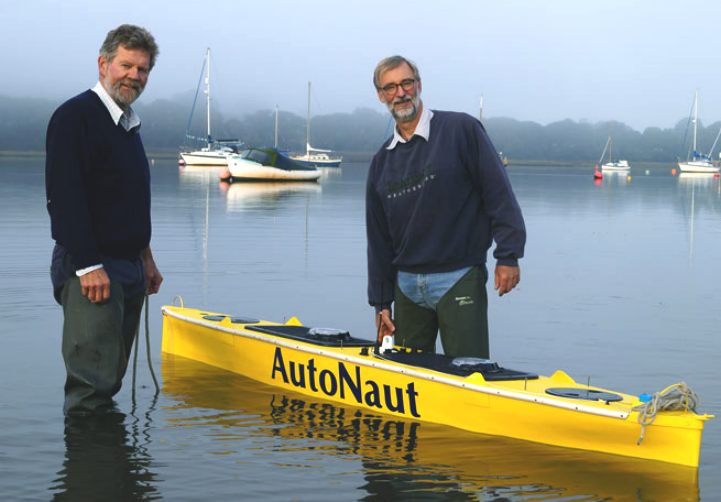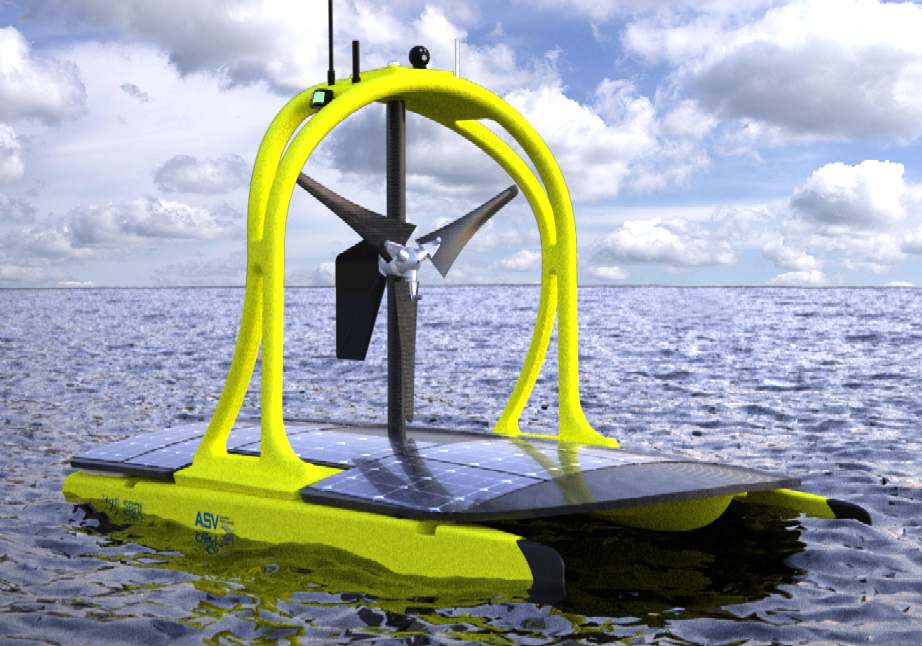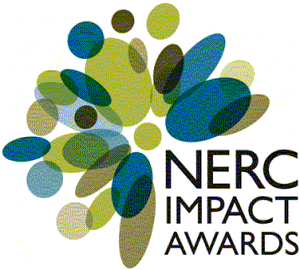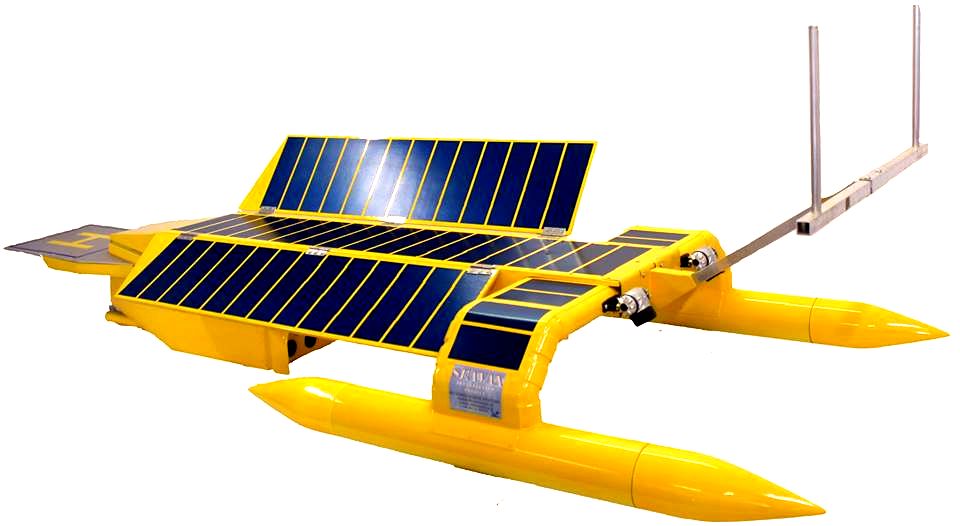|
N. E.R.C. National Environment Research Council
|
||||
|
The Natural Environment Research Council (NERC) and the Defence Science and Technology Laboratory
(Dstl), with the
Technology Strategy
Board, are running a Small Business Research Initiative (SBRI) competition to develop technology-enabled solutions addressing long endurance marine unmanned surface vehicles. Strategic plans of both of these organisations call for new capabilities in marine
robotics, for environmental research and for defence and security respectively.
Recognizing their common interests, and the potential for dual-use technology to enable persistent presence in the marine environment, innovative solutions are sought from industry.
Phase 2 competition winners (left) MOST AV Ltd of Chichester and (right) ASV Global Ltd of Portchester.
NERC IMPACT AWARDS 2015
To mark its 50th anniversary, NERC is pleased to announce its inaugural Impact
Awards. Recognising research that has achieved exceptional economic benefit. Recognising research that has achieved exceptional social, cultural, public policy or service, health, environmental or quality of life benefits. Recognising research that has achieved exceptional economic and/or societal impact outside the UK. Recognising an early career researcher who has achieved exceptional economic and/or societal impact within the UK or internationally.
b.
The impactful research and/or knowledge exchange and translation activity has been, or is currently funded by NERC. c.
Have met all conditions of their funding to date. d.
Early Career Impact Award: applicants must be a current NERC-funded PhD student or have no more than eight years of full-time work experience from the PhD certificate date to the closing date of the competition.
JUNE 2003
The next generation of ocean-going robotic vehicles will be developed by two cutting-edge technology companies from the South Coast of England, working with the UK’s National Oceanography Centre.
The competition open and close dates 17 September to 5 November 2012, were so incredibly tight, that only those in the local community had any chance of applying. Criticism was leveled at NERC on this issue. Hence, the term 'competition' is used in the broadest possible sense. Unless that is, there was a national advertising campaign that we are not aware of?
COLLABORATING WITH NOC
Collaboration with industry adds to the continued success of the National Oceanography Centre. By working with the Centre's scientists you will have access to:
* new ideas and emerging technologies from a wide range of oceanographic and geological disciplines * a wealth of expert knowledge * specialised equipment * links with other Natural Environment Research Council centres and the University of Southampton.
The Centre already has strong links with a variety of businesses including the themed research below, but we are actively developing links with a whole range of commercial sectors to ensure that our science is relevant to business needs.
* Partnership In Ocean Security (PIOS)
NOC encourage partnerships between public sector and industry throughout the research cycle, from design through execution to exploitation. As well as commissioned research, you could join a collaborative research programme where we can leverage access to research funding.
Projects could range from the planning, design and execution of full ocean surveys through to providing expert scientific or technological advice during a few days consultancy. There a variety of ways for organisations to access our research outputs and to participate in collaborations with us, for details of the full range of mechanisms please see our Working with NOC page.
Some examples can be found on our Impacts and Case studies page.
STUDENT PROJECTS
An Undergraduate, masters or PhD programme influenced by your company’s research requirement conducted at NOC under the supervision of an academic and the company.
Access funding to use our training and exchange opportunities
You could help to provide - and benefit from - an industrial training opportunity. The following schemes are available which NOC needs industrial partners for:
Collaborative Awards in Science & Engineering (CASE) Open Studentships
The CASE Studentship Open Competition promotes collaboration between the research community and the end-users of research.
A CASE studentship is a PhD studentship during which the student enhances their training by spending between 3 and 18 months with the CASE partner in a workplace outside the academic environment.
Knowledge Transfer Partnerships
Knowledge Transfer Partnerships (KTP) is a UK-wide programme enabling businesses to improve their competitiveness, productivity and performance.
A KTP achieves this through the forming of a Partnership between your business and an academic institution (such as university, further education college or research and technology organisation), enabling you to access skills and expertise to help your business develop.
Royal Society Industry Fellowship schemes
The Industry Fellowship scheme promotes the exchange of knowledge between academia and industry by establishing personal and corporate links between the two sectors. This should act as a foundation for long-term collaboration and development.
NERC Knowledge Exchange Fellowships
Part time Knowledge Exchange Fellowships are available in any area of policy, business or third sector with the aim of boosting the impact of any type of NERC funded science.
Research Council and European Commission Research Grants
We encourage partnerships between public sector research and industry throughout the entire research lifecycle, from design through execution to exploitation. Joining a project as a Project Partner, Steering Committee member or providing a letter of support can help ensure the science we undertake is focussed to be relevant to your interests.
Industry research funding
The Technology Strategy Board (TSB) is the national innovation agency whose goal is to accelerate UK economic growth by stimulating and supporting business-led innovation. TSB brings organisations together from the business and research communities to focus on opportunities, and investing in the development of new technology-based products and services for future markets.
The Energy Technologies Institute (ETI) is a UK-based public-private partnership formed from global industries and the UK Government. It operates at large-scale and is tasked with developing and demonstrating engineering and technology that will help the UK meet its legally binding 2050 carbon reduction targets under the Climate Change Act.
COMMERCIALIZATION
The Centre also has a strong record of transferring technologies to companies, through collaborative projects and licensing opportunities, to bring innovative products to the market place.
FUNDING CONTACTS
Administration of research grants, fellowships and training grants
The UK Shared Business Services (UKSBS) - formerly the RCUK Shared Services Centre (SSC) - is responsible for the processing of grants (research grants, fellowships and training grants) on NERC's behalf. All process queries should be sent to the contacts below:
Je-S registration, submitting applications and maintenance requests
jeshelp@rcuk.ac.uk 01793 444164
Questions relating to peer reviewing and peer review meetings (panels, boards, etc)
grantspreaward@uksbs.co.uk 01793 867018
Questions on maintenance and updates to existing awards
grantspostaward@uksbs.co.uk 01793 867121
Enquiries related to individual studentships funded on NERC grants should be sent to stag@nerc.ac.uk, not UKSBS.
You can use the Research Councils' Joint electronic submissions (Je-S) to manage your current NERC grants.
NERC funding awards policy
For advice on NERC funding awards policy, or to make a complaint concerning research grants, training awards, fellowships and peer review, please send your query in an email to the following NERC teams:
Studentships
Enquiries about studentships should be sent to stag@nerc.ac.uk. For urgent queries please contact:
Fellowships
Enquiries about fellowships should be sent to fellowships@nerc.ac.uk. For urgent queries please contact:
Research grants
Enquiries about grants should be sent to researchgrants@nerc.ac.uk. For urgent queries please contact:
Assessment process
Enquiries about NERC's assessment processes and peer review should be sent to college@nerc.ac.uk. For urgent queries please contact:
NERC science area contactsAtmospheric
science - Head
of discipline:
|
|
National
Oceanography Centre
|
National
Oceanography Centre
|
Joanne Donahoe, Asst Dir Fundraising: development@noc.soton.ac.uk.
Business Development team: business@noc.ac.uk
SBRI: sbri-noc@noc.ac.uk
Website: www.noc.ac.uk/sbri
LINKS & REFERENCE
http://auvac.org/community-information/community-news/view/935
http://www.xylemanalytics.co.uk/index.php
http://www.amc.edu.au/
http://www.gavia.is/
http://www.strath.ac.uk/na-me/
|
Funding across research councils Knowledge Exchange fellowships Royal Society industry fellowships Strategic Research Impact Scheme Doctoral training partnerships Large grants associated studentships Research programme grants associated studentships Research programme competition studentships AO - Zoonoses and Emerging Livestock Systems (ZELS) Advanced Training Short Courses AO 2014-15 Advanced Training Short Courses Research experience placements Independent Research Fellowships Environmental Big Data Capital Strategic Environmental Science NERC Strategic Environmental Science Capital funding Changes to responsive mode peer review processes Business, Policy and third sector internships in the Marine Renewable Energy sector. Chair of the Strategic Programme Advisory Group Research organisation eligibility Guidance for reviewers & introducers Developing and submitting ideas for strategic research New web app supports smart agriculture IPCC Fifth Assessment Report (AR5) The International Bioenergy Conference Analytical Science & Technology AO - Improving modelling capability Earth System Modelling Strategy Environmental Microbiology & Human Health Environmental Nanoscience Initiative Environmental Virtual Observatory Flooding from Intense Rainfall AO - Global Climate Model Development for Africa 2014 AO - Regional Consortium Grants 2014 Human-modified Tropical Forests Increasing Resilience to Natural Hazards AO - Site Survey Investigations Observations & Modelling of the TTL UPGro - Consortium AO - Full proposals Volatiles, Geodynamics & Solid Earth Controls Sustainable Marine Bioresources Initiative Applying to use the facilities International Opportunities Fund Coastal vulnerability & freshwater security Food security & land use change Announcement of Opportunity 2014 Environmental Information Strategy |
Building on PURE Associates funding call NERC Training Advisory Group (TAG) Become an environmental scientist Tools developed to capture value of nature AHRC joins NERC-BBSRC policy internships Large facility requirements survey Call for ideas - Strategic research priorities Implementing the new NERC strategy New collaborative research programme climate change negotiations NERC's new approach to strategic research New Chair for Strategic Programme Advisory Group NERC introduces Unconscious Bias Training New Chair for Training Advisory Group UK environmental science leads the world Ownership and governance of NERC centres Evaluation of NERC Centres 2013 42,000 research projects available business public - Gateway Timelines highlight UK contributions to eight great technologies Co-Evolution of Life and the Planet conference Celebrating 50 years of the Biological Records Centre NCEO and CEOI Joint Science Conference Business performance management Strategic planning & management Demonstrating our effectiveness The UK's seven research councils unite to fight AMR UK science trio called to Washington ocean summit JASMIN - Environmental science supercomputer upgraded RCUK commits £14m to UK Energy Research Centre NERC commits to research with China Working together to solve sustainable agriculture challenges New polar research ship for UK New Centre for Environmental Geochemistry to open in Nottingham NERC Research Centre achieves bronze Athena SWAN award New research projects announced to help save UK forests woods trees Study effects recent winter storms' impact southwest UK Report highlights NERC achievements UK water technology sector to boost economy by £8.8bn by 2030 NERC invests scheme solve business problems environmental data Science budget allocations 2015-16 NERC signs MoU with multinational energy company Shell NERC invests £4.6 million in Big Data Research effects storm surges sand dunes aid coastal management Entrepreneurial scientists scoop prize money at competition finals NERC announces the winner of its first photo and essay competition NERC supports growth responsible environmental management energy Better modelling of tsunami zones could help insurance quotes NERC signs MoU with global engineering consultancy Arup NERC invests £100m in environmental science doctoral training New Earth and Marine Science and Technology centre Archaeologists rediscover the lost home of the last Neanderthals Killer whales may have menopause so grandma can look after the kids Iron in the Earth's core weakens before melting Science Minister announces projects to monitor ocean currents Royal Research Ship Discovery to be named by HRH The Princess Royal Stress a key factor in causing bee colonies to fail Giant channels discovered beneath Antarctic ice shelf Female flies keep mating within the family New project may give insights into the evolution of human teeth Report highlights radical change needed to tackle avoidable food waste British public split on nuclear power Undersea mountains provide crucial piece in climate prediction puzzle Achilles' heel of ice shelves is beneath the water, scientists reveal New research shows that the 'landslides season' is changing Hottest days have warmed four times more than the global average Ambitious science mission sets off for Antarctica Climate change will upset vital ocean chemical cycles Study offers new insight into how cheetahs catch their prey Researchers pinpoint when the First Dynasty of kings ruled early Egypt NERC embraces European bioinformatics Mega-canyon discovered beneath Greenland ice sheet Robotic food helps scientists understand predators St Andrews ecologist wins photo prize European hunter-gatherers owned pigs as early as 4600BC Epic ocean voyages of baby corals revealed Warming Antarctic seas likely to impact on krill habitats Human foot not as unique as originally thought Alpha males don't have all the advantages Science spin-out adds colour to forest measurements Beetles dish out tough love to curb greedy offspring Plants can change greenhouse gas emissions after warming Research shows how females choose the 'right' sperm New web tool improves rapid ash cloud forecasts Ancient mammal relatives cast light on recovery after mass extinction Bright birds make good mothers Wildflowers sown across Bristol to encourage insect life Global investigation reveals true scale of ocean warming 'Insect soup' holds DNA key for monitoring biodiversity Bacteria hold the clues to trade-offs in financial investments evolution Shifting patterns of temperature volatility in the climate system Study reveals brown trout's tolerance to heavily polluted water British forests still feel the impact of the 1976 drought NERC welcomes the UK's strategy for agricultural technologies Ground-breaking agri-science research showcased in new timeline Loss of African woodland may impact on climate, study reveals Scientists discover new variability in iron supply to the oceans Bees under threat from bumblebee imports Fossil shows fish had sucker on its back Latest research defines values which determine public acceptance of energy system change Manure was used by Europe's first farmers 8,000 years ago Pentland Firth turbines generate "half of Scotland's electricity" Greenland ice sheet contribution sea level increase over next 200 years New ship for UK marine science handed over to NERC Birds outpace climate change to avoid extinction Finding the Goldilocks sites to store CO2 underground Earthworms could help scientists 'dig' into past climates Rocks can restore our climate - after 300,000 years Female scientists campaign for change in gender inequality in science Evidence suggests Antarctic crabs could be native University of East Anglia research reveals true cost of farming to UK economy Harvesting sustainable chemicals and energy and sea NERC funded professor wins 2013 Martha T Muse Prize CryoSat maps biggest ever flood beneath Antarctica The quantum secret to alcohol reactions in space RCUK welcomes government's investment plans capital infrastructure Flood Force film launched by Living With Environmental Change Shale gas resource figure released NERC research centres among the world's top 100 Older males make better fathers says new research on beetles Origins of 'The Hoff' crab revealed Treating infection may have sting in the tail, parasite study shows Current affairs make life hard for stickleback dads New appointments to the Natural Environment Research Council Funders have joined forces to offer £4.5m for research into soil ecosystems Billion-year-old water could hold clues to life on Earth and Mars Plants use underground networks to warn of enemy attack BIOMASS mission given go ahead to launch in 2020 CryoSat-2 mission reveals major Arctic sea-ice loss UK and USA collaborate in airborne climate science projects Innovations in soil science will grow the solutions to global food security |
MARINE ACADEMIC INSTITUTIONS A-Z
Australian Maritime - British Ocean Data Centre - Geneve - Hawaii Renewable - NERC - Newcastle Naval
NOC Oceanographic - Plymouth - Portsmouth - Queensland - Seoul Naval - SOTON
Strathclyde
Marine - Sussex
- TU
Delft - USP South
Pacific - Webb
Institute
By cutting the cost of oceanographic survey and speeding up data collection, we will learn more about the oceans, for which the Bluefish ZCC platform could be the ideal robotic ocean workhorse. Based on a stable SWASH hull this design is under development by British engineers. This robot ship uses no diesel fuel to monitor the oceans autonomously at relatively high speeds 24/7 and 365 days a year - only possible with the revolutionary energy harvesting system. The modular hullform is adaptable for automatic release and recovery of AUVs, ROVs or towed arrays, alternating between drone and fully autonomous modes. This vessel could pay for itself in fuel saved every ten years.
BIOLOGICAL SAMPLING - A Bluefish ZCC can be manned or unmanned. It is a scientific work station. Depending on specification, this incredibly versatile design can be put to most uses, even collecting and transporting live samples, with a modified ROV dock - used as a capture and holding tank for marine life, instead of housing a dedicated submersible.
This ship uses no diesel fuel in the quest to monitor the oceans at relatively high cruising speeds of between 7-10 knots, 24/7 and 365 days a year. What makes all of this possible is the revolutionary energy harvesting system that provides a power to weight ratio of more than 3kW per ton, with up to 7kW per ton being attainable using more exotic materials. That gives oceanographers the power to do more.
OIL SPILLS - Dedicated versions of the Bluefish ZCC platform could be deployed as oil clean-up robots, to cope with disasters like the Deepwater Horizon.
PLASTIC OCEANS - Adapted ZCCs operating in SeaNet fashion, could form a fleet to clean up the oceans of harmful waste that is estimated to be some 269,000 tons in size across an area roughly the size of Texas.
This website is Copyright © 2015 Bluebird Marine Systems Ltd. The names Bluebird™, Bluefish™, SeaNet, Ecostar DC50 and the blue bird and fish in flight logos are trademarks. The color blue is an essential element of the marks. All other trademarks are hereby acknowledged.





